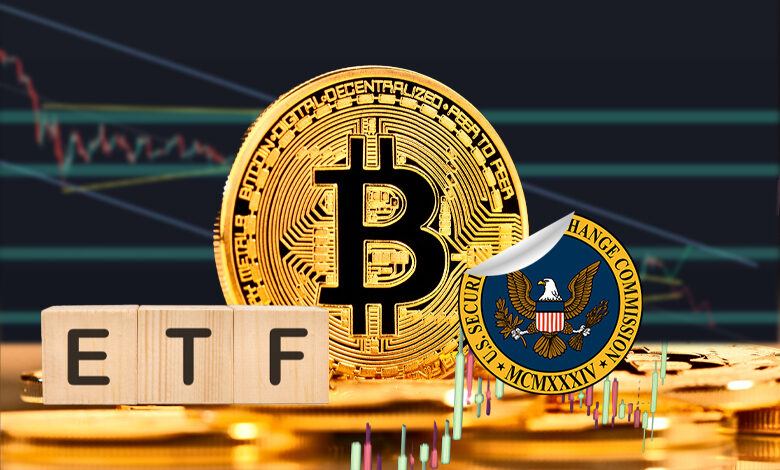Unlocking the Future with SEC-Approved Bitcoin Spot ETFs: Price Projections and Market Dynamics

Major financial players are pushing for Securities and Exchange Commission (SEC) approval to offer a new accessible Bitcoin investment avenue. BlackRock, the world’s largest asset manager, led the charge by filing for a spot Bitcoin ETF, prompting competition from firms like Fidelity, Invesco, and Wisdom Tree, all looking to tap into Bitcoin’s digital gold status.
While the SEC has previously rejected similar fund applications, BlackRock’s involvement and its proposed surveillance-sharing agreement have raised optimism in the crypto industry, signaling a shift in momentum.
Larry Fink, BlackRock’s Chairman and CEO, stressed their commitment to regulatory collaboration, emphasizing the importance of safety and security, especially with the BlackRock name associated.
Currently, institutional investors face limitations in directly investing in cryptocurrencies. However, approval of BlackRock’s filing by the SEC could open a cost-effective and regulated path for Wall Street into the digital token realm.
Bitcoin Investment Options: Futures ETFs vs. the Awaited Spot ETF
Currently, American investors seeking exposure to Bitcoin through regulated channels often turn to Futures ETFs. While the SEC has yet to approve a spot Bitcoin ETF, several Futures Bitcoin ETFs are actively traded.
Futures Bitcoin ETFs derive their value from Bitcoin Futures contracts, essentially tracking the performance of these underlying Futures tied to Bitcoin. This approach offers liquidity and regulatory oversight but comes with an implicit cost. It may or may not closely follow the actual spot price of Bitcoin, but it is the closest available option. In essence, Futures ETFs don’t require holding actual Bitcoin since they are backed by Futures contracts. However, the introduction of a spot Bitcoin ETF could potentially revolutionize how Wall Street approaches cryptocurrency investment.
The United States is on the verge of approving a spot Bitcoin ETF, and similar developments might soon occur in Hong Kong and other parts of Asia. However, not everyone supports the idea of crypto ETFs. Critics argue that Bitcoin-linked ETFs could present challenges surpassing those of centralized exchanges for the crypto market. Their primary concern lies in the fact that holders cannot withdraw the underlying asset. Consequently, they lose the fundamental advantage of Bitcoin: complete control over their funds without the need to rely on intermediaries.
Interestingly, while the SEC has expressed concerns about a spot Bitcoin ETF’s potential risk for investors, it has simultaneously given the green light to Bitcoin futures ETFs and the direct trading of digital assets on exchanges. Yet, the promise of spot Bitcoin ETFs as investment instruments is already materializing in different markets, such as Canada. A prime illustration is the Purpose Bitcoin ETF, which amassed over $400 million in assets under management within a mere two days following its debut.
Canada’s Success with Spot Bitcoin ETFs
Spot Bitcoin ETFs have been operating successfully in Canada for over two years, offering valuable insights for the ongoing discussion about these financial instruments in the US. While some argue against indirect ownership of underlying assets, it’s essential to consider the benefits ETFs provide to a wider investor audience.
In Canada, spot ETFs have demonstrated efficiency in mirroring direct exposure to Bitcoin portfolios, offering a solution that avoids the added uncertainties and volatility associated with the futures market and the operational opaqueness of unregulated exchanges.
Rigorous regulatory oversight in Canada has fostered transparent operations and a framework that minimizes risks like asset commingling, hacks, and fraud. Notably, Canadian spot Bitcoin ETF investors have experienced no asset hacks or losses due to malpractice, a contrast to issues faced by users of platforms like FTX, Celsius Network, and BlockFi.
Accessibility plays a pivotal role in the potential mainstream acceptance of an asset. The substantial investments flowing into Canada’s top three Bitcoin ETFs suggest that investors are drawn to the convenience of a Bitcoin-backed financial asset fully integrated into the traditional financial system.
Europe’s Move: First Spot Bitcoin ETF Signals Digital Asset Shift
London-based Jacobi Asset Management has introduced Europe’s first spot Bitcoin exchange-traded fund (ETF) on Euronext Amsterdam, almost two years after approval. Regulated by the Guernsey Financial Services Commission, the Jacobi FT Wilshere Bitcoin ETF trades as “BCOIN.” Custody is provided by Fidelity Digital Assets, and market making is handled by Flow Traders.
Remarkably, Europe now boasts a spot Bitcoin ETF ahead of the US, where numerous SEC applications have been denied. However, there’s renewed optimism for SEC approval, particularly after BlackRock led a wave of new applications with surveillance-sharing agreements to combat market manipulation.
Rania Gule, Market Analyst at XS.com, sees this ETF launch as an institutional catalyst for digital asset adoption. While the immediate impact on digital markets wasn’t observed, she believes it will have a significant long-term effect, supporting the rise of digital assets, particularly Bitcoin. Consequently, any future declines could represent a buying opportunity for long-term Bitcoin investors, says Rania.
A US Spot Bitcoin ETF Approval: Institutional Impact and Market Potential
The approval of a spot ETF would necessitate asset managers to hold an equivalent amount of Bitcoin as the ETF’s value. This could potentially lead to a surge in institutional Bitcoin holdings.
For instance, if investors purchased $100 million worth of a spot Bitcoin ETF, the ETF would need to acquire roughly $100 million in Bitcoin, accounting for fees. The volume of Bitcoin required for a spot ETF hinges on the anticipated demand, especially in its initial stages. Given that these ETF applications come from major asset managers, it’s plausible that the requirement could extend into the hundreds of millions, if not low-digit billions.
The aspiration is that institutional investors, who may have been hesitant to directly hold Bitcoin, will perceive this new asset as a safer avenue for investment. This perception could trigger a substantial increase in Bitcoin purchases. The introduction of ETFs, with regulatory oversight and daily exchange trading, coupled with transparent reporting of ETF contents and costs, can make Bitcoin more appealing to larger institutions for portfolio diversification.
Furthermore, the incorporation of Bitcoin ETFs into investment vehicles like retirement accounts has the potential to significantly boost Bitcoin’s market capitalization. With nearly $40 trillion in retirement assets in the U.S., envision a scenario where 5% to 10% of these assets are allocated to Bitcoin. That equates to 10% of a $40 trillion retirement asset pool, totaling $4 trillion. To put this into perspective, the current market cap of all cryptocurrencies combined is around $1 trillion, making it four times larger.
The Potential Impact of a US Spot Bitcoin ETF Approval on Bitcoin Price
Thomas Lee, Managing Partner and Head of Research at Fundstrat Global Advisors, envisions significant repercussions if a spot Bitcoin ETF gains approval in the United States. Lee suggests that the demand for Bitcoin would outstrip its daily supply, potentially driving the clearing price of Bitcoin to exceed $150,000 before the cryptocurrency’s scheduled halving in April 2024.
Fundstrat’s research highlights that Bitcoin’s daily demand, currently at approximately $25 million, roughly equals its daily mining rewards. However, the introduction of a Bitcoin ETF could inject an additional $100 million in daily demand for Bitcoin. Combined with the upcoming halving event, which is expected to reduce daily mining rewards to $12 million, this scenario would necessitate a substantial price increase to balance buyer and seller activity.
Fundstrat explains, “This [bitcoin ETF launch] would bring daily demand to $125 million, while daily supply is only $25 million. The implied equilibrium price would need to rise so daily supply matches daily demand. Equilibrium analysis suggests that a clearing price is $140,000 to $180,000, before the April 2024 halvening.”
Sean Farrell, Fundstrat’s Head of Digital Asset Strategy, emphasizes a multiplier effect for the bitcoin network, estimating a range of 4.0x to 5.0x. This suggests that each $1 of demand could result in a $4 to $5 increase in market capitalization.
Regulatory Challenges and Triumphs
Obtaining SEC approval remains the key challenge for ETFs, driven by concerns such as fraud, market manipulation, and the lack of surveillance sharing agreements. Despite increased SEC scrutiny and regulatory crackdowns in 2023, Bitcoin has seen a resurgence, with its price rising by over 80% to exceed $30,000. BlackRock’s filing amid this rally highlights Wall Street’s eagerness not miss out another bull run.
After BlackRock’s initial filing in June, the SEC found many ETF applications inadequate, prompting firms to refile with enhanced surveillance sharing details to counter market manipulation concerns. These firms have partnered with trusted entities like Bank of New York Mellon and Coinbase and have secured surveillance agreements with NASDAQ to enhance security. They aim to demonstrate to the SEC their commitment to safety measures, hoping for approval.
If approved, these ETFs could benefit Bitcoin investors, otherwise, they may have to wait for another catalyst for Bitcoin’s next bullish phase.
However, it’s not all challenges on the regulatory front. Globally, regulatory frameworks are becoming clearer, fostering crypto hubs in Singapore, Hong Kong, the UAE, and Europe. These regulations support market growth, transparency, and investor protection, paving the way for crypto ETFs and institutional demand. For instance, Hong Kong’s recent rollout of retail cryptocurrency trading through licensed exchanges hints at the possibility of Asia’s inaugural spot crypto ETF on the horizon.
Crypto ETFs Dominate Top 15 Performing ETFs in 2023
Crypto and blockchain ETFs are making waves as the top 15 performing funds of the year all hail from this sector. Leading the pack is the Valkyrie Bitcoin Miners ETF, with an impressive 227% return in 2023. This ETF focuses on Bitcoin mining companies, including Marathon Digital, Riot, and Cipher Mining.
Notably, many of these mining firms have outperformed Bitcoin itself this year, boosting the ETF’s performance. The VanEck digital transformation ETF follows closely with a 182% return YTD, tracking crypto and tech firms like Coinbase, MicroStrategy, and Galaxy Digital.
Other strong performers include the Global X Blockchain ETF (BKCH), Bitwise Crypto Industry Innovators ETF (BITQ), and Invesco’s Alerian Galaxy Crypto Economy ETF (SATO), with gains ranging from 162% to 168% YTD.
These ETFs reflect the growing interest and investment in the crypto space, offering diversified options for investors seeking exposure to this dynamic market.
The Crypto ETF Revolution: What’s Next?
The emergence of crypto ETFs isn’t just a shift; it signifies a financial revolution on the horizon. This transformation promises to reshape the financial landscape, extending far beyond monetary considerations. It carries the potential to usher in a more inclusive, transparent, and efficient financial system, opening doors to broader market participation.
Leading global asset managers’ growing interest in Bitcoin spot ETFs, coupled with strategies to address SEC concerns, has heightened the chances of approval, as stated by analysts led by Gautam Chhugani. Bernstein predicts a substantial spot Bitcoin ETF market, potentially reaching 10% of Bitcoin’s market capitalization within two to three years.
Europe’s recent approval of its inaugural spot Bitcoin ETF in Amsterdam isn’t merely a milestone; it mirrors the excitement surrounding BlackRock’s application for a Bitcoin spot ETF with the SEC. The potential impact of BlackRock’s ETF approval is immense, with speculation of a significant Bitcoin price surge.
Bloomberg analysts have raised the odds of Bitcoin spot ETF approval to 65%, citing recent SEC actions and growing crypto demand as pivotal factors. As the crypto landscape evolves and regulatory bodies adapt, all eyes are on the potential consequences of a US Bitcoin spot ETF’s approval.
The question that lingers: Will the US follow Europe’s lead in this crypto revolution?





